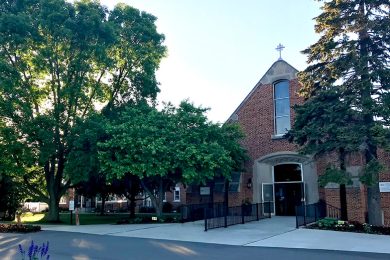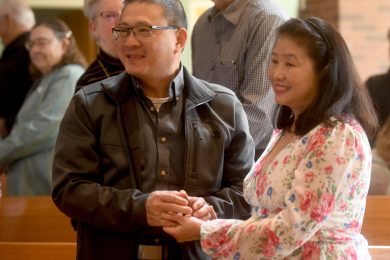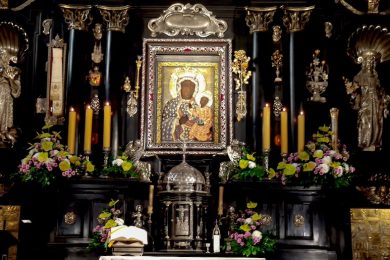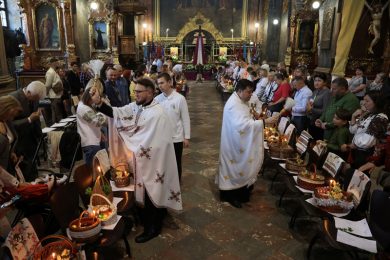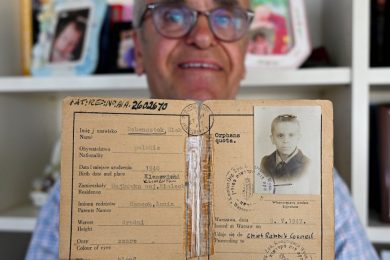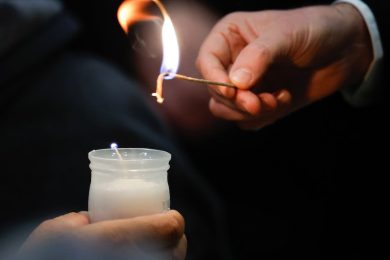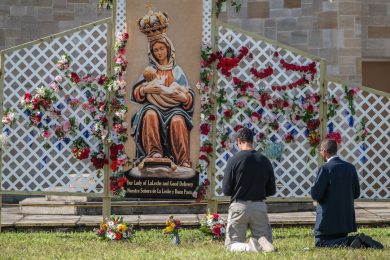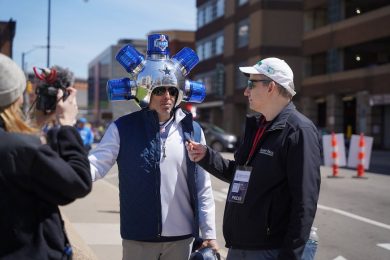Bishop Frank Caggiano of Bridgeport, Connecticut, likes to tell this story:
“At one of the closing sessions at the diocesan Synod we held in 2014, a young man, in a heartfelt way, stood up and said, ‘I have to stand to remind everyone that what we want [young people] is what you want. We are not a problem to be solved. The things that we are hoping the church can provide us are the same things that any person would want.
“It was a very powerful, very wise moment. And he’s right.” Bishop Caggiano said. “What do the young people want? They want heartfelt liturgy — celebrated beautifully and reverently — that uplifts the soul. Everybody wants that. They want homilies and preaching and moments of catechesis that really feed their hearts and their desire to know the Lord. Everybody wants that. They want vibrant communities. Everybody wants that.”
Bishop Caggiano will visit the St. Cloud Diocese Sept. 25 to give the keynote address at Diocesan Ministry Day.
The title of his talk is “Rebuild My Church: Missionary Discipleship and the Young Church.”

“In our contemporary age that faces both challenges and opportunities, Pope Francis challenges us to dedicate ourselves to the work of missionary discipleship,” Bishop Caggiano said.
“He asks that we bring the Good News of Christ’s salvific and merciful love to everyone, especially those who find themselves on the periphery of society,” he added. “Yet, how do we live such discipleship? How can we especially serve our young people? My talk will explore missionary discipleship in the hope of identifying ways by which we can live this calling effectively and joyfully.”
The bishop will also lead the “hot topic” breakout session, “Nine Cardinal Rules for Ministry with Youth and Young Adults.”
Bishop Caggiano has served as episcopal adviser of the National Federation for Catholic Youth Ministry and presently serves on several committees of the U.S. Conference of Catholic Bishops, including the Committee on Evangelization and Catechesis, the Committee on Ecumenical and Interreligious Affairs and the Committee on Laity, Marriage, Family Life and Youth.
In light of his upcoming visit, The Visitor asked Bishop Caggiano to shed some light on his work with youth and young adults and discuss the opportunities and challenges ahead.
Q: There’s been a lot of talk about youth and young adults lately, especially as dioceses across the nation prepare for the Encuentro process at both the local and national levels, the 2018 Synod of Bishops “on Young People, the Faith and Vocational Discernment,” and the initiative that you’ve been a part of called the National Dialogue on Catholic Pastoral Ministry with Youth and Young Adults. How are these efforts intertwined?
Bishop Caggiano: The way I see it is as pieces of a mosaic being put together. All of these efforts are moving in the same direction to help future leaders, young adults and people of faith to go from an encounter with the Lord, or a deepening of their encounter with the Lord, to allowing that relationship to jettison them to become missionary disciples.
 The image I use that makes the most sense to me is the process of falling in love with a person. All of these processes are different ways of trying to strengthen groups and communities to facilitate its members and people of goodwill to fall in love, stay in love and deepen their love for the Lord, in the community of the church.
The image I use that makes the most sense to me is the process of falling in love with a person. All of these processes are different ways of trying to strengthen groups and communities to facilitate its members and people of goodwill to fall in love, stay in love and deepen their love for the Lord, in the community of the church.
Q: What is the current landscape of Catholic youth and young adults in the U.S.?
Bishop Caggiano: The current landscape is one that is filled with both challenge and opportunity. The challenges are well known: Young people are finding it more and more difficult to affiliate in an active way with any established religious community.
In that sense, they are children of their era, where institutions have all been called into question. Given the rise of not only the basic kind of philosophy of secular life where its very individualistic but also social media and technology, which allow us to create virtual communities of our own choosing, a lot of young people struggle with the idea of being “religious.” They accept the idea of being “spiritual” and of having a relationship with God. It’s a question of, “Do I need a community to do that? Do I need your community to do that? Do I need the community you want to hand to me?”
I think that’s the largest challenge — this disaffiliation that’s going on and the relevance of the community.
But then there are opportunities. Young people themselves are beginning to explore different paths to affiliate back to the church, to rediscover the richness of the Catholic faith, to engage their emotions and their affective side, to engage their imaginations and creativity. There is also lots of great work being done, enticing them and leading them back to the church.
Q: Why this synod now?
Bishop Caggiano: The synod came from the Holy Father. It doesn’t surprise me, though, because a lot of what he is talking about is centered on youth and young adults. I think the Holy Father has made it clear that for us to become a church that images to the world — in word and deed — the merciful, forgiving love of God, the young church has the commitment and the energy to go out there into the trenches.
We are all called to do it, but as we get older we have our own challenges. The youth have the vigor, the zeal, the enthusiasm and commitment. And then they go out there and they do it. I think the Holy Father wants to unleash that energy and power as part of the renewal of the church. It’s mutually beneficial.
There’s the other piece of the puzzle. For those of us who are older, we wonder to ourselves who is going to take on the mantle of leadership and everything we’ve built up, who is going to take our place? Working with young people and allowing them to take the lead gives us the reassurance that, yes, there are people who are going to step into leadership, who are going to follow after us, so they give us courage and encouragement.
For young people, one of the main challenges they need to face is that enthusiasm and passion are great, but it has to be tempered with wisdom and knowledge and experience, which older people can give to younger people. The young need not make the same mistakes we made when we were young. Both generations grow and are enriched in the interaction between each other.
Q: How do the changing demographics affect the way we minister to youth and young adults?
Bishop Caggiano: It is clear that in the U.S. the majority of Catholics under 18 are Hispanic/Latino and that has huge implications for the life of the church. I think they are all positive implications. Not only because diversity is a great strength and it forces people to break out of their own small mindedness, but because there is such a tremendous richness in the traditions, prayer and cultural expressions that we can learn from each other about.
Q: How does this fit into the whole concept of missionary discipleship, the theme of Diocesan Ministry Day?
Bishop Caggiano: Missionary discipleship is the challenge of Pope Francis that unites all of these activities. The backdrop of it all is what we are being asked to do — to be missionary disciples of the Good News of our relationship with the Lord, which presumes we have a relationship with the Lord, a vibrant loving one that is lived within community, which is the church.
My talk is going to explore both of those pieces — the personal relationship and the missionary outreach. My hope is it will be in broad strokes so that everyone can see their ministry somewhere in the same large global task.

